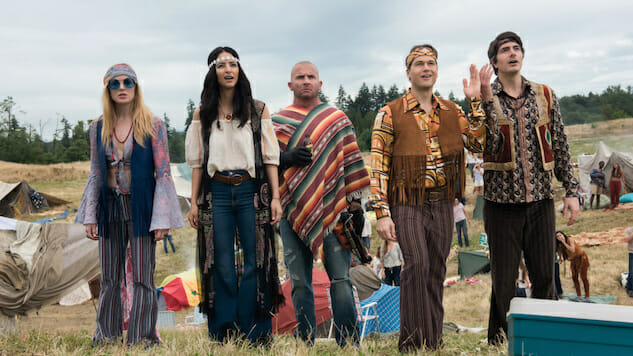ICYMI: DC’s Legends of Tomorrow Is Such an Old-School Action Show, It Must’ve Traveled Through Time
Photo: Dean Buscher/The CW
The return of fall television brings with it the return of now-familiar discussions about why you should be watching DC’s Legends of Tomorrow. In fact, not only did Entertainment Weekly feature one of these pieces just last week, it did so while interviewing Beebo, the anthropomorphic breakout of Season Three (more on that character later). Legends of Tomorrow is simultaneously a focal point of network (and DC TV) programming and an absolute underdog of a series. At this point, people aren’t tuning out of Legends of Tomorrow because they haven’t heard the good word; it’s hard to call Legends of Tomorrow “underrated” when there are so many pieces telling everyone that Legends of Tomorrow is underrated. It’s actually quite beloved.
People have superhero fatigue, though: No matter how many times you try to tell them otherwise, it’s tough to convince viewers that a particular show doesn’t take itself as seriously as the superhero properties that are responsible for said fatigue. The thing about Legends of Tomorrow, though—the thing that makes it fun, and far from self-serious—is that it doesn’t feel like today’s superhero series. It feels like the TV series of yesteryear. The true difference between Legends of Tomorrow and its DC TV companions on The CW is that it’s not trying to rewrite or define the superhero genre within a modern context; instead, it’s going back to the action-adventure series of the ‘80s and ‘90s and recapturing what worked about them. The key to Legends of Tomorrow isn’t that it’s doing something new. It’s that it’s making the old seem new again.
In fact, Legends of Tomorrow isn’t just atypical for a DC TV show. It’s atypical for contemporary television. (The closest “mainstream” genre show in recent memory I can compare it to is Starz’s Ash vs. Evil Dead, and going back a little further, USA Network’s “Characters Welcome” shows, like Burn Notice and especially Psych. No wonder Legends of Tomorrow rarely gets its due.) Since Season One—and in a way that’s only improved as the series has become more confident in its strengths and aware of its weaknesses—Legends of Tomorrow has taken its initial premise—the place for the also-rans of the DC TV universe—and transformed it into a fully-functioning, 21st-century version of the first-run syndication series of the 20th. Programs like Xena: Warrior Princess, Hercules: The Legendary Journeys, or even Mutant X, which took larger-than-life concepts, molded them to their not-so-large budgets, and made some pretty memorable television in the process. And any signs of campiness was a part of their charm, which honestly feels like the first rule of Legends.
Of course, Legends of Tomorrow has a larger, more 2018 budget than these shows. But it’s still a throwback: Tonally and in terms of execution, the series, which follows a team of misfits with access to time travel, resembles Sliders or Quantum Leap, high-concept episodic TV series that had much more potential for serialization than the industry was ready for at the time. Legends of Tomorrow isn’t anti-serialization or anti-big picture, but it does focus on presenting every episode as a miniature movie-of-the-week that anyone can drop into, which is hard to find in a modern superhero show. The characters are still fighting the Big Bads, but since the first season, no episode has ever been too bogged down in that. I’ve written before that reboots and revivals of this type of TV series could work tremendously with the changes to the dominant storytelling style, and Legends of Tomorrow is essentially an original concept that supports this theory.
-

-

-

-

-

-

-

-

-

-

-

-

-

-

-

-

-

-

-

-

-

-

-

-

-

-

-

-

-

-

-

-

-

-

-

-

-

-

-

-








































